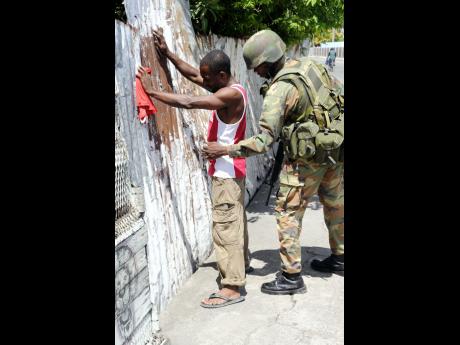‘You can’t arrest your way out of the problem’ - British security specialist cautions cops
From the Suppression of Crime Act of 1974 to special police squads by the scores, states of emergency and zones of special operations, Jamaica has pushed hard policing measures to tackle the crime monster, but a security specialist from the United Kingdom is warning that around the world these measures are destined to fail unless more is done.
Alethea Fuller, head of the Policy and Commissioning Division for the Police and crime commissioner in West Midlands, says hard security measures will have little impact on crime and violence if the authorities fail to address the needs of vulnerable teenagers, who are the primary gang recruitment pool in almost all jurisdictions.
According to Fuller, the voice of the youths is critical in any security strategy implemented by the Government.
"I don't think we can do this work without the community. We cannot go into a community and do work without them being involved. They are not going to want to know. They have got to come up with the solution," Fuller told The Sunday Gleaner during an exclusive interview last week.
"They have got to tell us what it is they want to change, and what we do is work with them to make that change," added Fuller, whose team has worked extensively with businesses, parents, teenagers, and even ex-convicts in Birmingham to address the gang situation there.
She said the British Government has allocated £2 million, over the next two years, to address recommendations made by the community to stem gang violence, which is evolving from knife-related attacks to the use of guns in drive-by shootings.
"You can't tell people about their life if you haven't lived it, and I think gang members have a really important message to tell ... you can't arrest your way out of the problems," declared Fuller.
NO WAY OUT
She noted that many youngsters do not necessarily regard their clusters of friends as a gang, while others believe there is no way out of gangs after initiation.
Fuller added that even after conviction some gangsters find it difficult to transition back into society as they have little or no support system. She said her mandate is to help such individuals to see a better future.
Deputy Superintendent Shane McCalla, head of operations for the St Andrew South Police Division, where there are at least 50 known criminal gangs, 15 of which are said to be active, agreed with Fuller that community interaction is pivotal in addressing the problem.
"It is very important because if the community does not buy into the safety and security then the police will find their jobs very difficult," said McCalla.
"I don't like to make a distinction between soft and hard policing, it is policing in general, just two different strategies. So the safety and security part involves partnering with the residents, the business people and neighbourhood watches. We also have regular meetings, highly publicised meetings with the communities," added McCalla.
A 2017 study undertaken by the Ministry of National Security reported that there are 274 gangs operating in Jamaica with some 9,000 members. Almost 80 of these gangs were considered major organised criminal enterprises.
The report also stated that there are growing numbers of children within schools who are involved in or associated with gangs.
The ministry, through the Citizen Security and Justice Programme, has been targeting young boys to reduce the likelihood of them becoming involved in gang-related activities.
"We intend to build on the successes of this methodology with a fundamental shift to focus on the eight to 15-year-old cohort, who are of a more impressionable and vulnerable age, and reduce the capacity for the gangs to recruit our young men," Minister of National Security Dr Horace Chang announced at the start of this year.
"We expect greater success. Our strategy will begin in 20 of our most vulnerable and volatile communities identified in consultation with the Planning Institute of Jamaica," added Chang.


